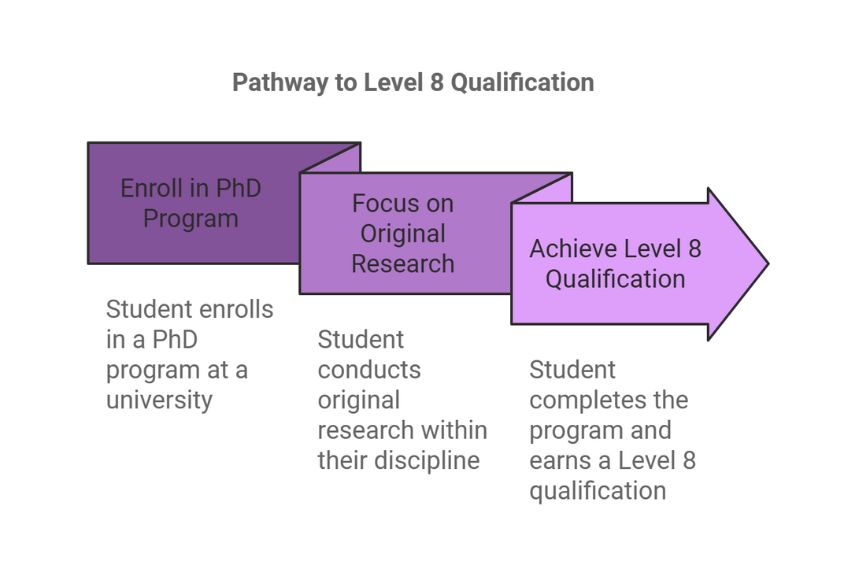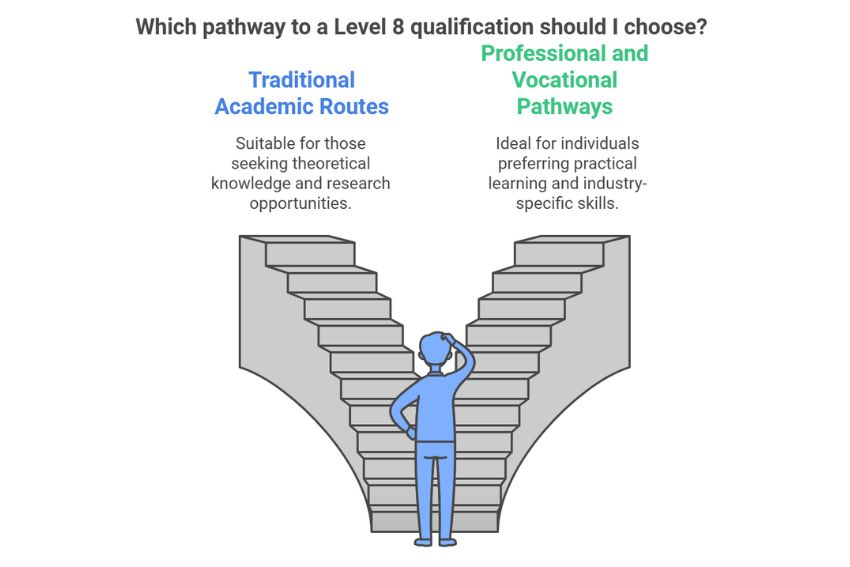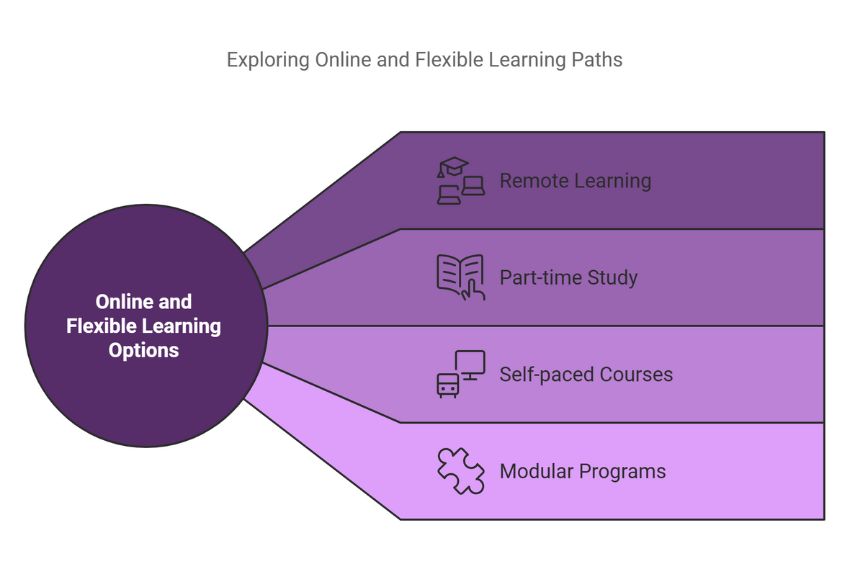When it comes to education qualification in the UK are organised into levels. These levels help to show how advanced a qualification is, making it easier to understand what each one represents. Furthermore, The UK’s Regulated Qualifications Framework (RQF) is the system that ranks qualifications from Level 1 to Level 8. The higher the level, the more difficult and advanced the learning becomes.
At the top of this system is Level 8, the highest possible qualification. This level includes achievements like PhDs (Doctor of Philosophy) and professional doctorates, which require advanced study, research, and expertise in a specific field. People who achieve Level 8 qualifications are considered experts in their subject. These qualifications sit far beyond the compulsory school years and key stages, typically pursued well after university-level study.

Why is achieving a Level 8 qualification significant?
Achieving a Level 8 qualification is a huge accomplishment. In fact, it shows that a person has reached the peak of learning and knowledge in their field. Moreover, it’s not just about learning facts; it’s about being able to create new knowledge and solve complex problems. As a result, people with a Level 8 qualification often take on roles as university lecturers, researchers, and senior industry leaders.
Another big advantage of a Level 8 qualification is its value in the job market. Employers see it as proof that a person has top-level skills in critical thinking, research, and problem-solving. It also opens the door to higher-paying jobs and leadership positions in many industries. For example, in fields like science, education, and business, a Level 8 qualification can set you apart from others and help you achieve top roles.
In summary, the UK’s qualification system ranks learning from Level 1 to Level 8, with Level 8 being the highest. It represents the ultimate achievement in education, showing mastery, leadership, and the ability to generate new knowledge. For many, it’s the key to unlocking career success and becoming a respected expert in their field.
Understanding Level 8 Qualifications
A Level 8 qualification is the highest level of qualification in the UK’s education system. It represents an advanced level of study where people become experts in a specific subject. At this level, learners do more than just learn information – they create new knowledge and develop original ideas. This level is often linked to research, leadership, and innovation.
People with Level 8 qualifications are expected to handle complex issues and offer solutions to real-world problems. As a result, these qualifications are recognised as the top level of education in the UK. Moreover, they require a high level of dedication, research skills, and critical thinking.
What qualifications are included at Level 8?
At Level 8, there are different types of qualifications that people can achieve. Here are the most common examples:
- Doctorates (PhD)
- This is the most well-known Level 8 qualification.
- It requires several years of research on a specific topic.
- Students must complete a thesis (a large research project) and defend their findings in front of a panel of experts.
- It is common for people who want to become university professors, researchers, or industry leaders.
- Professional Doctorates
- These are similar to a PhD but are more focused on practical knowledge and professional practice.
- Fields like education (EdD), business (DBA), and healthcare (DClinPsy) often offer professional doctorates.
- People who complete these qualifications work as leaders in their professions.
- Level 8 Diplomas
- Unlike a PhD, a Level 8 Diploma focuses on specialised training and practical skills.
- It’s often aimed at senior professionals, managers, and industry experts.
- Level 8 Diplomas are shorter than a PhD and may not require a thesis.
- These diplomas show that someone has mastered a particular area of work or research.
- Level 8 Certificates and Awards
- These are shorter qualifications that offer a deep level of knowledge in a specific area.
- They are usually focused on a specific skill or competency.
- People may take these awards to gain expertise in specialised fields or upgrade their skills for career development.
Pathways to Attaining a Level 8 Qualification
Achieving a Level 8 qualification is a significant accomplishment that requires dedication, hard work, and the right pathway. There are multiple ways to reach this advanced level, and each path caters to different career goals, learning styles, and personal commitments. Whether you’re interested in academic research, professional development, or flexible study options, there’s a pathway to suit your needs.
Here’s a breakdown of the main pathways to attain a Level 8 qualification:
1. Traditional Academic Routes (e.g., PhD Programmes)

This is the most well-known route to achieving a Level 8 qualification. Typically, it involves enrolling in a PhD (Doctor of Philosophy) programme at a university. Moreover, PhD programmes focus on original research in a specific field of study and aim to develop experts who can make new contributions to knowledge.
How it works:
- Duration: Usually 3 to 6 years (full-time or part-time options available).
- Main Task: Students choose a research topic and work on a thesis or dissertation, which is a detailed research project.
- Assessment: After completing the thesis, students must defend their research in front of a panel of experts.
- Outcome: Successful candidates are awarded the title of Doctor (e.g., Dr John Smith).
Who is it for?
This pathway is ideal for those who want to become university lecturers, academic researchers, or industry specialists. It is also perfect for people with a passion for in-depth research and knowledge creation.
2. Professional and Vocational Pathways

Not everyone wants to pursue academic research. Instead, some people prefer to focus on practical learning and industry-specific expertise. For this reason, professional and vocational pathways offer an excellent alternative to traditional PhD programmes.
What are the options?
- Professional Doctorates: These qualifications are similar to PhDs but focus on practical problem-solving in specific industries. Examples include:
- (DBA) Doctor of Business Administration
- (EdD) Doctor of Education
- (DClinPsy) Doctor of Clinical Psychology
- Level 8 Diplomas: These qualifications provide practical skills and knowledge for industry leaders, senior managers, and specialists. Instead of research, students focus on developing their abilities in real-world situations.
- Level 8 Certificates and Awards: These are shorter courses that offer specialist knowledge in niche areas. They are useful for people who want to upskill or gain expertise in a specific field.
Who is it for?
If you’re a professional looking to advance your career in business, healthcare, education, or industry, this pathway is ideal. It’s also perfect for people who want to work in senior leadership roles or become industry experts.
3. Online and Flexible Learning Options

In today’s fast-paced world, many people want to pursue higher education while managing jobs, family, and other responsibilities. This is where online and flexible learning options come in. Technology has made it possible to complete a Level 8 qualification remotely from anywhere in the world.
How it works:
- Online PhD and Doctorates: Many universities now offer fully online PhD programmes that provide the same level of education and recognition as on-campus degrees.
- Online Diplomas and Certificates: People can also enrol in online diploma or certificate programmes to boost their career credentials. These courses have flexible deadlines, so students can learn at their own pace.
- Blended Learning: Some programmes use a hybrid format where students attend a mix of online classes and in-person workshops.
Who is it for?
If you need flexibility in your schedule or want to balance work, family, and education, this pathway is a great choice. It’s also ideal for international students who want to earn a UK Level 8 qualification but can’t relocate.
There are three key pathways to attaining a Level 8 qualification
- Traditional Academic Routes like PhD programmes, which focus on research.
- Professional and Vocational Pathways like professional doctorates and Level 8 diplomas, which focus on industry expertise.
- Online and Flexible Learning options, which offer the chance to study from anywhere in the world at your own pace.
Each pathway caters to a different type of learner, including academic researchers, working professionals, and online students. Regardless of the path you choose, a Level 8 qualification ultimately proves you have mastered advanced knowledge, leadership skills, and the ability to solve complex problems.
What is a PhD?
A PhD (Doctor of Philosophy) is a Level 8 qualification and one of the highest academic qualifications in the UK. It focuses on original research, where students create new knowledge or offer fresh insights in a specific field. Unlike traditional degrees, a PhD involves working on a thesis – a large research project that must show a unique contribution to the subject area. Once complete, students defend their thesis in front of experts in a process called a viva voce (oral exam).
PhDs are available in various fields, such as science, technology, humanities, and social sciences. Typically, students work with a supervisor and can study either full-time, part-time, or remotely. On average, most PhDs take between 3 to 7 years to complete, depending on the chosen study mode.
Many people pursue a PhD because it opens pathways to careers as university lecturers, researchers, or senior industry professionals. Moreover, employers highly value it since it showcases expertise, critical thinking, and problem-solving skills, ultimately opening doors to high-level roles and leadership positions. Earning a PhD also grants the prestigious title of “Doctor”, which symbolises authority and mastery in a chosen field.
What are the entry requirements?
The entry requirements for a Level 8 qualification depend on the type of qualification you are pursuing, such as a PhD, professional doctorate, or diploma. However, some general requirements apply to most Level 8 pathways.
- Academic Qualifications
- You will usually need a master’s degree (Level 7) in a relevant subject.
- In some cases, universities may accept a bachelor’s degree with honours if you have significant research experience.
- Research Proposal
- For PhDs, you must submit a research proposal outlining your project idea, research goals, and methodology.
- This proposal shows universities that you have a clear direction for your study.
- Professional Experience
- Some professional doctorates or diplomas require relevant work experience.
- For example, if you’re pursuing a Doctor of Education (EdD), experience in the education sector is often required.
- Language Proficiency
- If you’re an international student, you may need to prove your English language skills through tests like IELTS or TOEFL.
- Interview
- Some universities or institutions may conduct an interview to assess your motivation, research goals, and ability to complete the programme.
These requirements may vary depending on the university or institution. It’s always best to check specific entry criteria for your chosen course.
Similar Blogs








